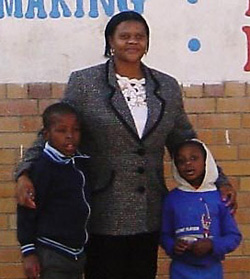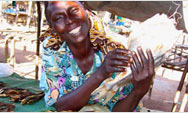You are here » Home » Telling Our Story
First Person
A determined teacher and mother helps care for HIV/AIDS orphans
Caring for Children Affected by HIV/AIDS

| |
Photo: USAID/Reverie Zurba
Phyllis Malope, center, cares for the welfare of children in Westonaria, a poor community outside of Johannesburg, South Africa.
|
|
“Challenges remain, but we have opportunities to expand and build Philani’s capacity,” said Phyllis Malope, director of Philani Community Development, an organization working to help children and families affected by HIV/AIDS. In collaboration with the President’s Emergency Plan for AIDS Relief, USAID helps Philani build capacity.
|
Phyllis Malope is passionate about vulnerable children whose parents have died from HIV/AIDS. She helps care for 1,200 orphans in Westonaria, 30 miles west of Johannesburg, South Africa. This former farmland is overgrown and overpopulated. Most residents are jobless, and families suffer poverty and illiteracy. There is just one school, and classes stop after the ninth grade. The closest high school is 35 kilometers away.
Phyllis is a teacher by training, but she began to dedicate herself to this community in the l980’s, when she started a kindergarten class for toddlers whose parents worked nearby. She worried how these children would find jobs if they never finished school. She volunteered with a local group, Philani Community Development, which strived to help youth survive these harsh conditions.
When Phyllis learned that USAID provided training to organizations like Philani, she knew this was a chance to make a big impact. USAID helped train Phyllis and other staff on how to interact effectively with local governments. By collaborating with authorities, they could get help for their community. Phyllis learned how local governments work and lobbied councilors and ward committees to assist their HIV/AIDS efforts. Over time, this strategy paid off. The organization received some funding, and staff learned skills like how to help HIV/AIDS orphans obtain identity documents and access government grants.
Today, Phyllis continues her work with Philani: she is the organization’s director. She attributes much of Philani’s achievements to USAID and the training that they received. She is also helping the local government implement an HIV/AIDS strategy in her district. She continues to take a deep personal interest in her community, and the difficulties that many face. She tells the story of an HIV-positive mother who was too weak to continue. She took her two sons to Phyllis on the way to the hospital and said, “I’ve heard about you. May I leave my children here? If I don’t come back, please don’t let them be apart.” When she died, Phyllis adopted the brothers. Together with her own son, she is a mother of three. One of her adopted sons is HIV positive and takes anti-retroviral medicine. Phyllis speaks fondly of the boy, who obviously adores her. He dreams of working one day because, he says, he wants to buy his mother nice presents.
Print-friendly version of this page (435kb - PDF)
Click here for high-res photo
Back to Top ^ | 

